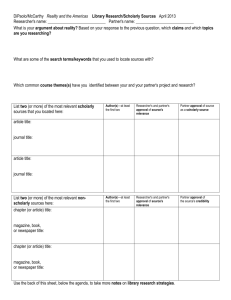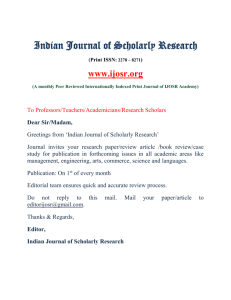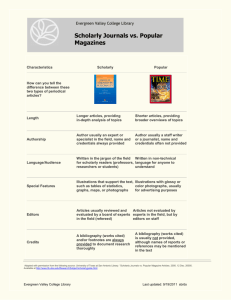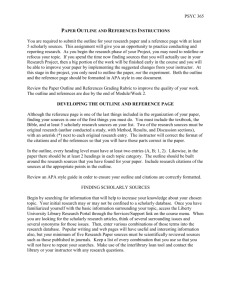Finding the Right Sources
advertisement
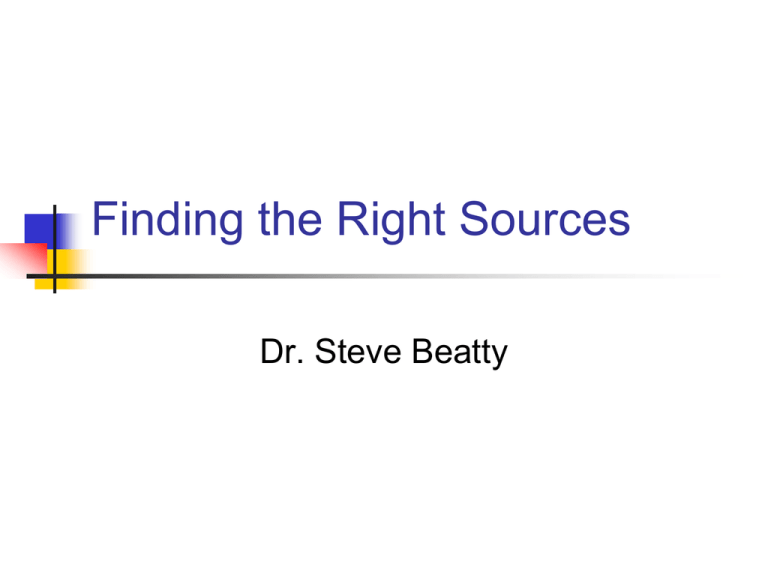
Finding the Right Sources Dr. Steve Beatty Types of Sources Primary Sources Primary Sources A first hand account. Grant wrote his Personal Memoirs to secure his family's future. In doing so, the Civil War's greatest general won himself a unique place in American letters. His character, sense of purpose, and simple compassion are evident throughout this deeply moving account, as well as in the letters to his wife, Julia, included here. "Perhaps the most revelatory autobiography of high command to exist in any language." —John Keegan Primary Sources If you are researching the American Dream in the works of F. Scott Fitzgerald, then The Great Gatsby is a primary source. Primary Sources Similarly, if you are researching quest films, then The Lord of the Rings is a primary source. Types of Sources Primary Sources Secondary Sources Secondary Sources An indirect account. If you are researching the leaders of the Revolutionary War, then a study of our “founding brothers” would be a secondary source. Secondary Sources Similarly, a book about film noir would be a secondary source. However, a film noir such as the classic Double Indemnity would be a primary source. Primary or Secondary? Which category would the Director’s Commentary to The Godfather fall into? Answer: Primary Types of Sources Primary Sources Secondary Sources Scholarly Sources Scholarly Source In academia, your professors will expect you to utilize scholarly sources in your papers. So what is a scholarly source? Scholarly Source Newsweek? Scholarly Sources The easiest way to identify a scholarly source is to see if they document their sources. For example, Newsweek does not include parenthetical documentation or a Work Cited after its articles. Why? Because it is written for a mass audience not a scholarly one. Scholarly Source Newsweek? No. The New York Times? Newspaper Hierarchy What are the top 4 American newspapers? Top 4 U.S. Newspapers The New York Times The L.A. Times The Washington Post The Wall Street Journal Newspapers There is a hierarchy of newspapers. You would generally use the papers on the previous slide before The Arizona Republic, for example. When wouldn’t you? If it were a local issue, like illegal immigration, where The Arizona Republic might be seen as more authoritative. Newspapers Newspapers are not generally considered scholarly sources and, thus, typically should NOT appear as sources in your papers. Still, you might use them at times as a primary source, say if you are writing about a war and the reporter is reporting from the war. Scholarly Source Newsweek? No. The Journal of Marketing? Yes The Journal of Popular Culture? Yes Ladies’ Home Journal? No Scholarly Source However, articles in the Journal of Marketing will have in-text documentation and a Bibliography. That’s because it is aimed at a scholarly audience and one of the things a scholarly audience looks for is whether the author has done their homework and consulted the proper authorities. Scholarly Sources? Newsweek? No. The New York Times? No. The Journal Of Marketing? Yes. The Journal of Popular Culture? Yes Ladies’ Home Journal? No. Source Criteria You’ve run a search and found 25 possible sources. So how do you decide which sources are the best sources? First criterion? Source Criteria Authority If you’re researching horror, the guy on the left is an authority on the subject. Source Criteria What if you don’t know who the authority is? Review the literature and see who is constantly cited. Source Criteria Multiple Intelligences Search the lit and you’ll soon discover Howard Gardner is the authority. Source Criteria In some cases, the authority might be an organization or governmental agency. Source Criteria Currency All things being equal, we would prefer the most current research. After all, we’ve learned a bit about DNA in the past decade. Source Criteria However, authority trumps currency. You still probably should mention Freud’s The Interpretation of Dreams if dream interpretation is your subject even though the book is over 100 years old. Source Criteria Sometimes, you’ll need contemporary accounts as well as the most current sources. For example, if you’re researching the Civil War, you’ll want some contemporary accounts as well as the most current research. Source Criteria Objectivity In the 50s, cigarette companies sponsored studies that claimed smoking helped reduce tension and sore throats. Source Criteria Of course that would never happen today . . . Can you say supplements? Source Criteria Authority Currency Objectivity So be sure to consider these criteria when determining which sources to use for your paper.


